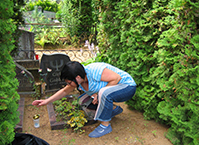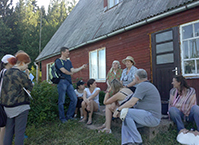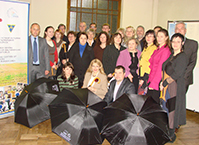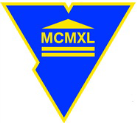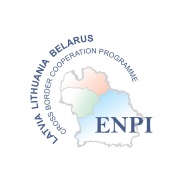Lubou Veramei: About the economy
Categories: Family, Lubou Veramej
Please tell me what did the village look like? What did the houses and roads look like?
The roads were made of cobblestone. The roads were bad. The houses were thatch-roofed. Thatch. Thatch sheaves. We shook thatch and made sheaves. We made big even thatch sheaves. We shook out this small one, and used only strong one, I remember these sheaves, I shook them myself already. I was already a teenager; our father taught us how to do this. Well. And they thatched the barns, they thatched houses. Well. And houses, of course, were not very good in comparison with the present ones, of course.
What was there in the house?
There were the following in the house. Benches. There were benches all around the walls of the house. There was a table there. The curtains, I remember, were made of newspapers. The curtains. Made of paper. And sometimes you could see curtains made of white, clean white paper, scissored out, and one was jealous because… that person was rich, he took this paper somewhere. It was very beautiful, nice, wow, this paper. Well. You know... the floor was... some people had ground in the house, there wasn’t any floor, and it was just the rammed clay.
Was there a floor in your house?
In our house? I remember there was a floor in our house. I don’t remember that there wasn’t a floor there. And our neigh... our uncle who lived next to our house had a floor too. The floor was made of rammed clay. Then holes appeared in it. There was such a clay in the corridor, there wasn’t any floor. We didn’t have such a floor, there was a floor made of rammed clay.
How was the house heated?
How was it heated? The house? There were stoves, stoves, ordinary stoves… stoves were made of bricks. We made bricks ourselves. Father made bricks himself. We tempered clay. He made bricks himself and then made stoves of these bricks. Well. They made them. And when parents got married … just when they married and the first daughter was born my mother and father told me that there wasn’t a stove in the house, so they made fire in the middle of the house, there wasn’t a floor yet there, so they heated water and bathed their baby this way. Well. And after that bit by bit they started to make bricks, and made a stove before winter came. So they lived this way.
Where did you take water?
Where did we take water? First they went to village Stariya Turki to get some water. With barrels, by horse. They reared horses, our father had two horses already. Well. And you know… at that time they dag a well before the war. So father dag a well and didn’t manage to take water out of this well, didn’t manage to put these well rings as he was drafted into the military, to the war. So this well was left, and when he came back, he dag in this well as there was a huge stone low in the well, a big stone. Well. So they dag a new one in another place. So he dag a well, he made the well rings himself, we just helped him: we brought gravel, we watered the well rings until they cemented-in. That is that. The well was placed near the window. There was a pond next to the house. Father dag it.
What did you use the pond for?
For the cattle, we watered the cattle there. Well. We kept sheep at that time. And not one cow but more we kept after that. We had two horses and 14 ha of land that needed to be cultivated.
Images
Video
Researcher: Олег Коляго, старший преподаватель, ГрГУ им. Я. Купалы


